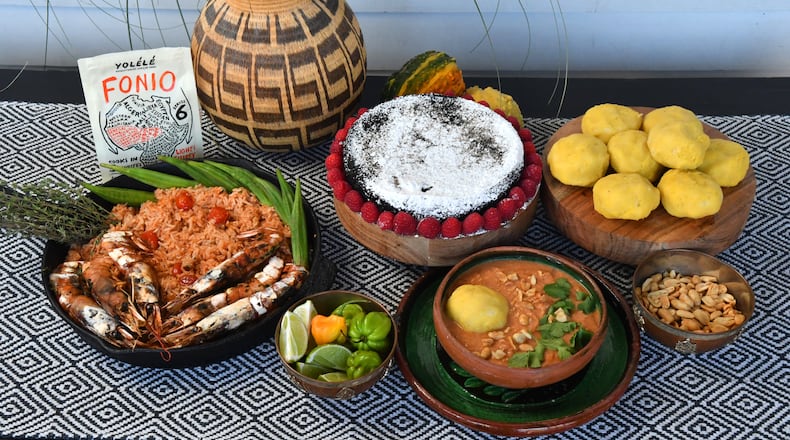Recently, when I asked chef Pierre Thiam why West African cuisine was suddenly being touted as a new food trend, he laughed and said, “It’s been around for a few thousand years.” Then he thought for a minute and added, “It’s a cuisine that’s pretty much been unknown, but has influenced so many other cultures around the world.”
Born in Dakar, Senegal, Thiam also is an author and activist, known for bringing West African cuisine to the fine dining world with his New York City restaurant Teranga in East Harlem. These days, though, he’s heavily involved in his food company, Yolélé.
Around Atlanta, you’ll find West African cooking at restaurants such as Cafe Songhai in Peachtree Corners, which specializes in dishes from Nigeria, Ghana and Ivory Coast. And Island Grill in Duluth is a Nigerian restaurant that offers up classics such as jollof rice, okra stew, and fufu dumplings.
What’s more, the ongoing Jollof Festival of Atlanta not only offers food trucks, music and art, but it also holds a jollof cooking contest.
From his point of view, Thiam acknowledges that those are encouraging signs, especially compared to his early struggles to have West African cuisine recognized.
“As a young chef in New York City, I realized that West Africa was absent in the so-called food capital of the world,” he said. “You take a country like Nigeria, it has over 200 languages, so you can imagine how rich the culture is. Food is culture, and that’s very much how we approach food in West Africa.”
Credit: Handout
Credit: Handout
Asked about the cultural connection between the different regions, and beyond, Thiam pointed to the way recipes traveled and underwent many different interpretations.
“For instance, with okra stew, you see it with lots of seafood, and sometimes meat mixed into the same recipe,” he said. “But (in Senegal), there’s always palm oil. And, by the way, it became known as gumbo in New Orleans. You go to Bahia in Brazil, you see West African cuisine in all its richness.
“But it’s cuisine that transcends the borders, and really tells a different story of West Africa itself. It’s a decolonizing story that doesn’t believe in the borders that were imposed on us. So you see jollof in Nigeria, in Ghana, in Senegal, and in Sierra Leone. And you see a version of jollof in jambalaya. So, again, that tells you how resilient this food is.”
The signature product of Yolélé is fonio, a tiny, nutritious grain with a nutty flavor that is grown by smallholder sub-Saharan farmers and used in myriad ways.
“Fonio is very important because it’s a grain that’s not only a nutritious powerhouse, but it’s gluten-free,” Thiam said. “Also, it’s a grain that grows in poor soil, requires very little water, and because it has deep roots, it restores the soil. For me, it was important to think about the economic impact of bringing opportunities among the poorest farmers and communities in the sub-Saharan region.”
Thiam also is the author of “The Fonio Cookbook” (Lake Isle Press, $24.95), which to my surprise features a recipe for beer made with fonio. And recently, Garrett Oliver of Brooklyn Brewing created Yolélé Fonio White Beer, a craft beer brewed with fonio.
“We understand how culture, and food in particular, is a great bridge,” Thiam said. “If we take the time to look at it as a way to reconnect with who we truly are, I think it’s a powerful tool. Food is an evolution, but it’s always inspired by the past.”
Credit: Handout
Credit: Handout
RECIPES
These recipes celebrate the foodways of West Africa, from classic peanut soup, and the cassava dumplings called fufu, to fonio, the ancient gluten-free grain that can be an ingredient in everything from beer to chocolate cake.
Credit: CHRIS HUNT
Credit: CHRIS HUNT
Peanut Soup
This West African-inspired recipe may be best remembered as a classic from “The Moosewood Cookbook” of the 1970s. Served with fonio and cassava dumplings, it makes a hearty meal for a fall or winter evening.
Credit: CHRIS HUNT
Credit: CHRIS HUNT
Fufu
These quintessential African dumplings made from fonio, a grain native to West Africa, are very large, and known by many different names, including fufu in Nigeria and Congo. Look for fonio at Sevananda Natural Foods Market as well as select Whole Foods Markets or purchase it online at Amazon or African foods marketplace yolele.com.
From “The Fonio Cookbook” by Pierre Thiam (Lake Isle Press, $24.95) and reprinted with permission.
Credit: CHRIS HUNT
Credit: CHRIS HUNT
Jollof Rice with Roasted Shrimp and Okra
Jollof rice is a dish cooked throughout West Africa with a variety of proteins, including seafood, lamb and chicken. This version with shrimp and okra has elements of both gumbo and jambalaya.
Credit: CHRIS HUNT
Credit: CHRIS HUNT
Fonio Chocolate Cake with Raspberries
With coconut oil and cocoa, this flavorful fonio cake tastes a lot like a Mounds bar. It will serve eight or more, and will keep refrigerated in a sealed container for up to a week.
Adapted from “The Fonio Cookbook” by Pierre Thiam (Lake Isle Press, $24.95) and reprinted with permission.
About the Author
The Latest
Featured







